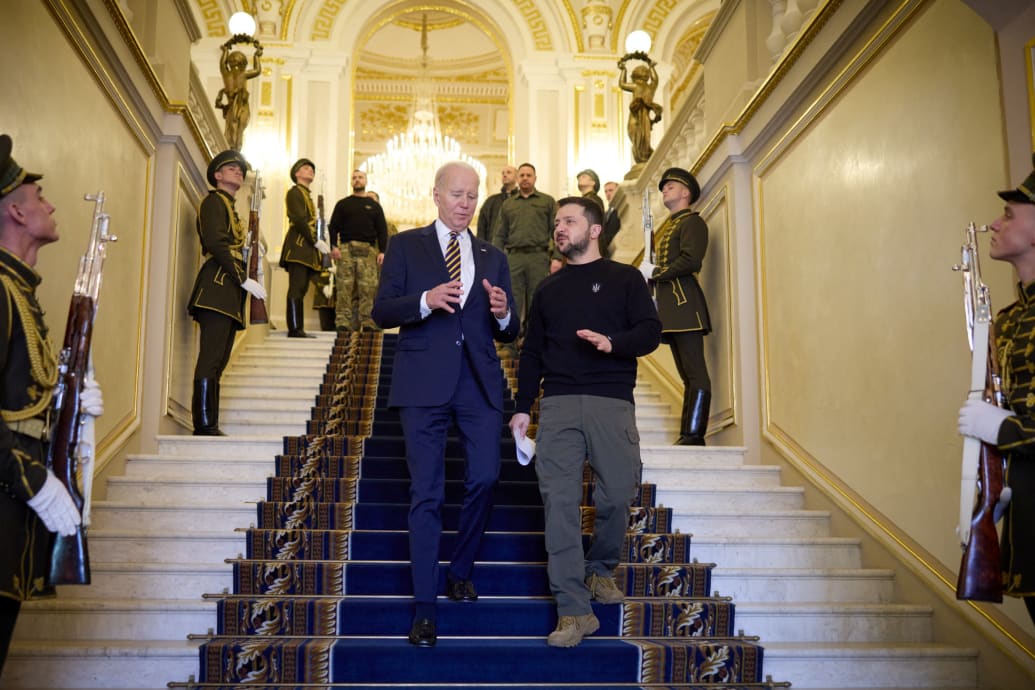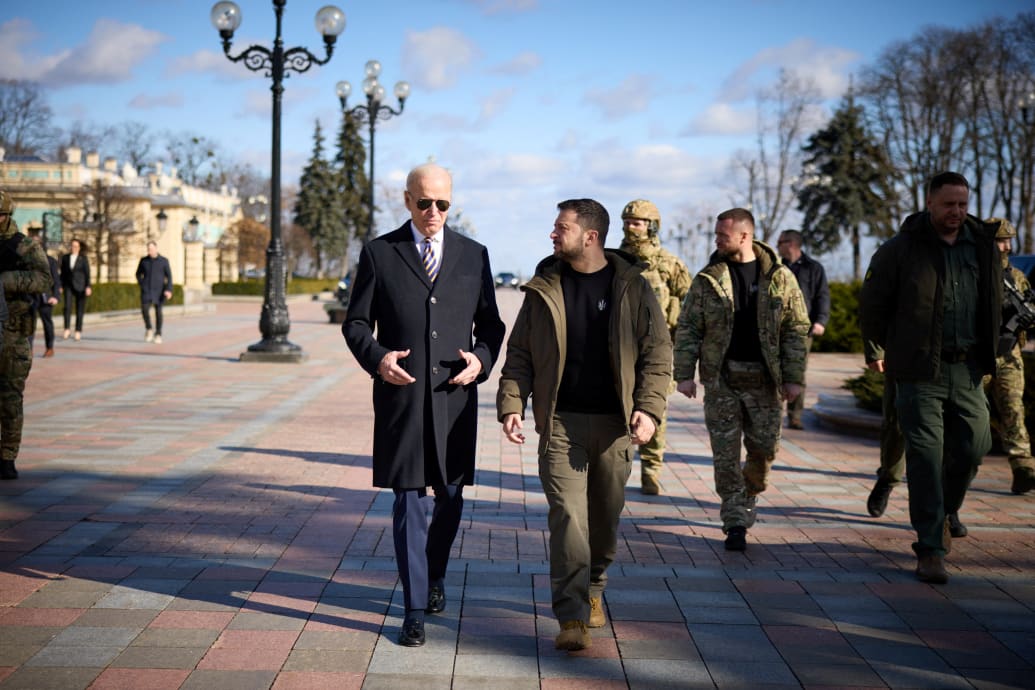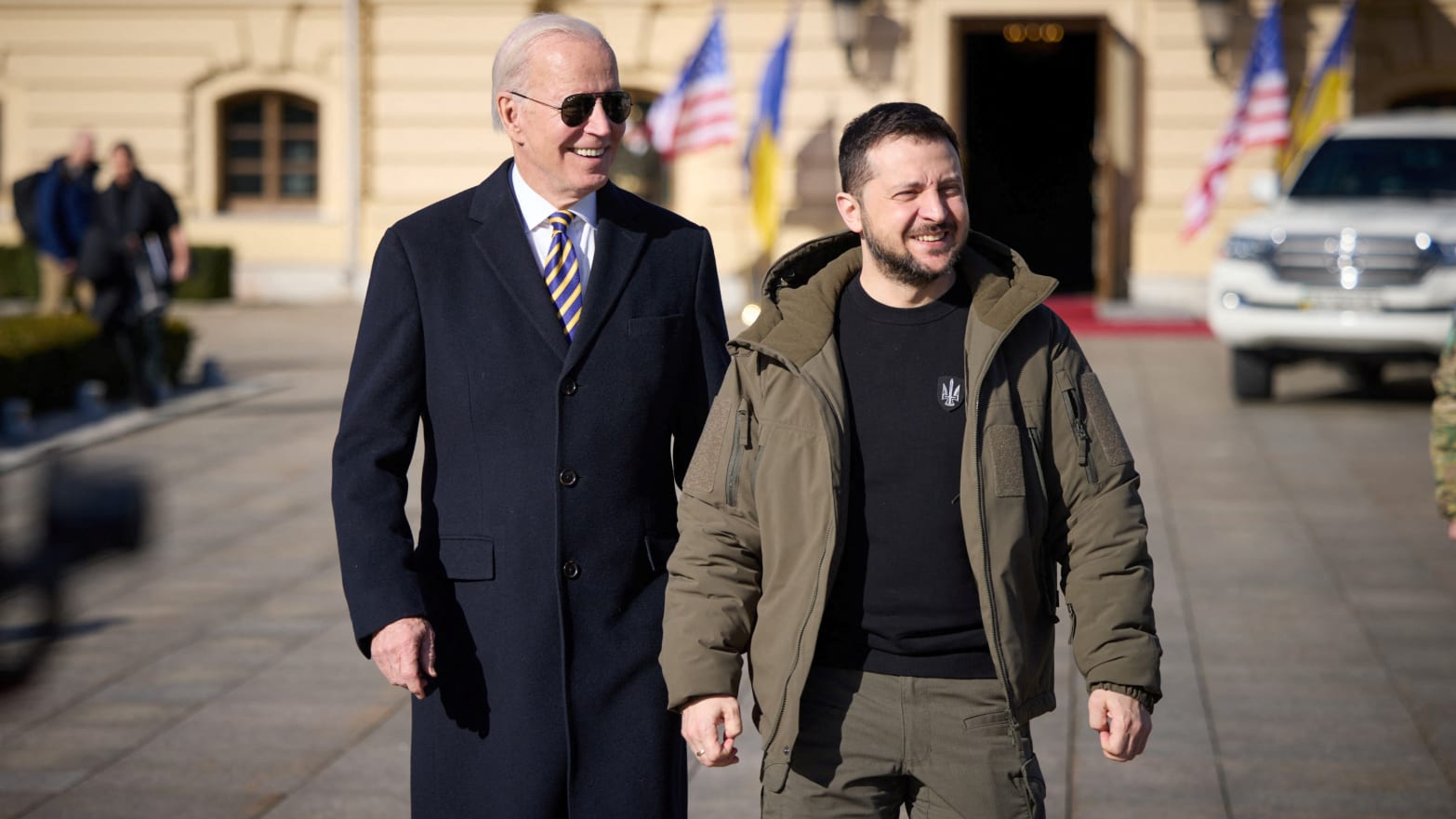Kennedy and then Reagan in Berlin. Now Biden in Kyiv.
Periodically during the past sixty years, American presidents have stood up at the Eastern edge of Europe and looked to Russia to say, “We stand with our allies. Our resolve is unshakeable.”
Kennedy said, “Ich bin ein Berliner.” Reagan said, “Mr. Gorbachev tear down that wall.” Biden, on his surprise President’s Day visit to Kyiv said, “One year later, Kyiv stands. And Ukraine strands. Democracy stands.”
Stirringly, just days ahead of the one year anniversary of Russia’s brutal offensive against Ukraine, Biden walked through the streets of Kyiv, paid his respects to those who had fallen in defense of Ukraine, and said, “Freedom is priceless. It’s worth fighting for, for as long as it takes.”
Biden also movingly invoked the conversation he had with Zelensky last February as Russia’s massive escalation of its nine-year-old war of unprovoked aggression against Ukraine. He recalled with Zelensky at his side, “You said you didn’t know when we’d be able to speak again. That dark night…the world was literally bracing for the fall of Kyiv…perhaps even the end of Ukraine.”
Of course, the symbolism of the American president standing alongside Zelensky, walking through the Ukrainian capital even as air raid sirens sounded, carried many other messages as well.
To those fighting for Ukraine, it was a vitally important message of solidarity that came with further commitments from Biden of military support for Ukraine.
To Vladimir Putin, it was Biden’s way of saying, “I am here in Kyiv and you are not. You not only did not take Kyiv in days as some predicted, but your attack was rebuffed. Your army suffered a humiliating defeat from which it has not recovered.”

Ukraine’s President Volodymyr Zelenskiy and U.S. President Joe Biden walk inside the Mariinskyi Palace, amid Russia's attack on Ukraine, in Kyiv, Ukraine February 20, 2023.
Ukrainian Presidential Press Service via Reuters
Biden emphasized this point in the official White House statement about the trip saying, “Putin thought Ukraine was weak and the West was divided. He thought he could outlast us. But he was dead wrong.” Importantly, it was a comment that was underscored in recent days by the significant Congressional delegation that attended the Munich Security Conference to make it very clear, support for Ukraine continues strong in the U.S. and it is bipartisan.
The official White House statement also underscored that Biden’s surprise visit to Ukraine was part of a larger mission, one of solidarity and leadership among America’s European allies. Biden, in the statement said, “I also look forward to traveling on to Poland to meet President Duda and the leaders of our Eastern Flank Allies, as well as deliver remarks on how the United States will continue to rally the world to support the people of Ukraine and the core values of human rights and dignity in the UN Charter that unites us worldwide.”
The reference to the UN Charter as well as Biden’s visit also had the effect of supporting statements made by Secretary of State Blinken in the wake of conversations with his Chinese counterpart on the edges of the Munich conference. Blinken stated that China was “considering providing lethal support” to Russia to aid in its invasion of Ukraine and warned that such action would have serious consequences.
Biden’s trip sent an important reminder to Beijing just how high a priority Ukraine is for the U.S. and the West and presenting the war in the context of Russia’s violations of international law will emphasize to the Chinese that directly supporting Russia’s attack and serial war crimes would make China an accessory to those crimes. The sanctions China would endure and the rift such a step would incur with the international community would be devastating for China, particularly given the fragility of its economy at the moment.
If there was yet another audience for Biden’s trip, it was naturally, the American people. Biden, in going to Kyiv, offered the clearest possible reminder of his stance against Russian aggression from the first moments of his presidency. It illustrated that he did not hesitate to support Ukraine when it was imperiled and that his leadership among our allies worldwide has been one of the signature triumphs of his first term in office.
NATO, recently adrift and doubted by other U.S. political leaders, was stronger than ever, on the verge of expanding. America’s international leadership, recently in doubt, was once again beyond doubting.
In sending this message, Biden pointedly evoked without mentioning his name yet another American president in a visit to the Eastern edges of Europe: Donald Trump during his 2018 Helsinki meeting with President Vladimir Putin. Biden went to Europe to send Putin a message of American and allied strength. Trump went to grovel before Putin. Biden stood up for American values and our allies. Trump said he trusted Putin more than America’s own intelligence and law enforcement services. Biden embodied America’s strength. Trump illustrated and represented our greatest weakness.
A year after Trump embarrassed the country in Helsinki, he compounded the offense by withholding aid from Ukraine in an attempt to extort Zelensky into doing political dirty work against Biden to help Trump’s reelection efforts. It was an illegal act that ultimately led to Trump’s first impeachment. At the same time and throughout the following year according to reports from Trump’s own top advisors, he was actively advocating to withdraw American troops from Europe.
There is no doubt that had Trump been re-elected, today we would be witnessing an American president standing alongside his Russian counterpart not Zelensky, marking the weakening of the West, not its enduring strength. Perhaps that prospect, the sense that America was weak and divided and did not care about Ukraine, would not lead the fight to preserve democracy, encouraged Putin to undertake his ill-fated, hugely costly, profoundly ill-considered invasion last February. It seems likely it had an effect leading to that disastrous miscalculation.

Ukraine’s President Volodymyr Zelenskiy and U.S. President Joe Biden walk outside the Mariinskyi Palace, amid Russia's attack on Ukraine, in Kyiv, Ukraine February 20, 2023.
Ukrainian Presidential Press Service via Reuters
We cannot know. But what we know today is that thanks to the resolve of Biden and the West and the inspiring courage and resilience of the people of Ukraine and that country stands strong, Russia’s army has been weakened, depleted and revealed to be profoundly dysfunctional.
We also cannot know what challenges the next phases of this war are likely to present. But thanks to Biden’s visit today, it is crystal clear that Ukraine will not be facing them alone and that Ukraine’s enemies and their current and potential allies should never again underestimate the resolve of the United States and NATO to do what they have been doing for decades, since Kennedy’s trip and Reagan’s, to defend with whatever it takes our values, our democracies and the security provided by an international order based on the rule of law.

